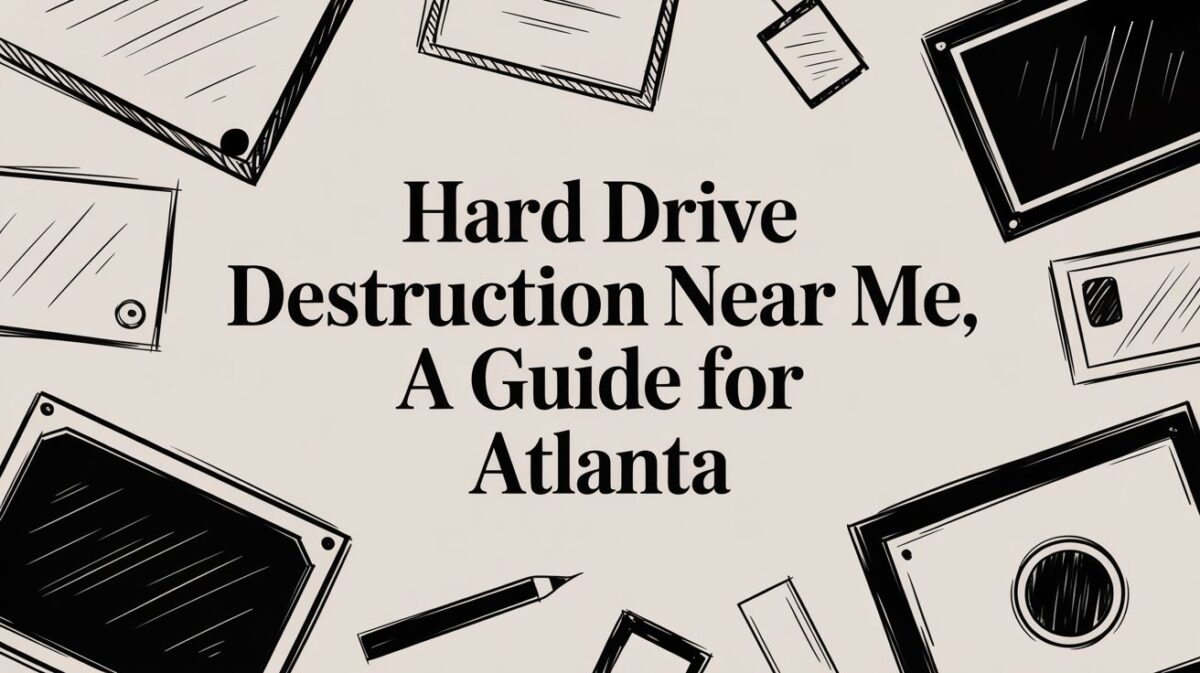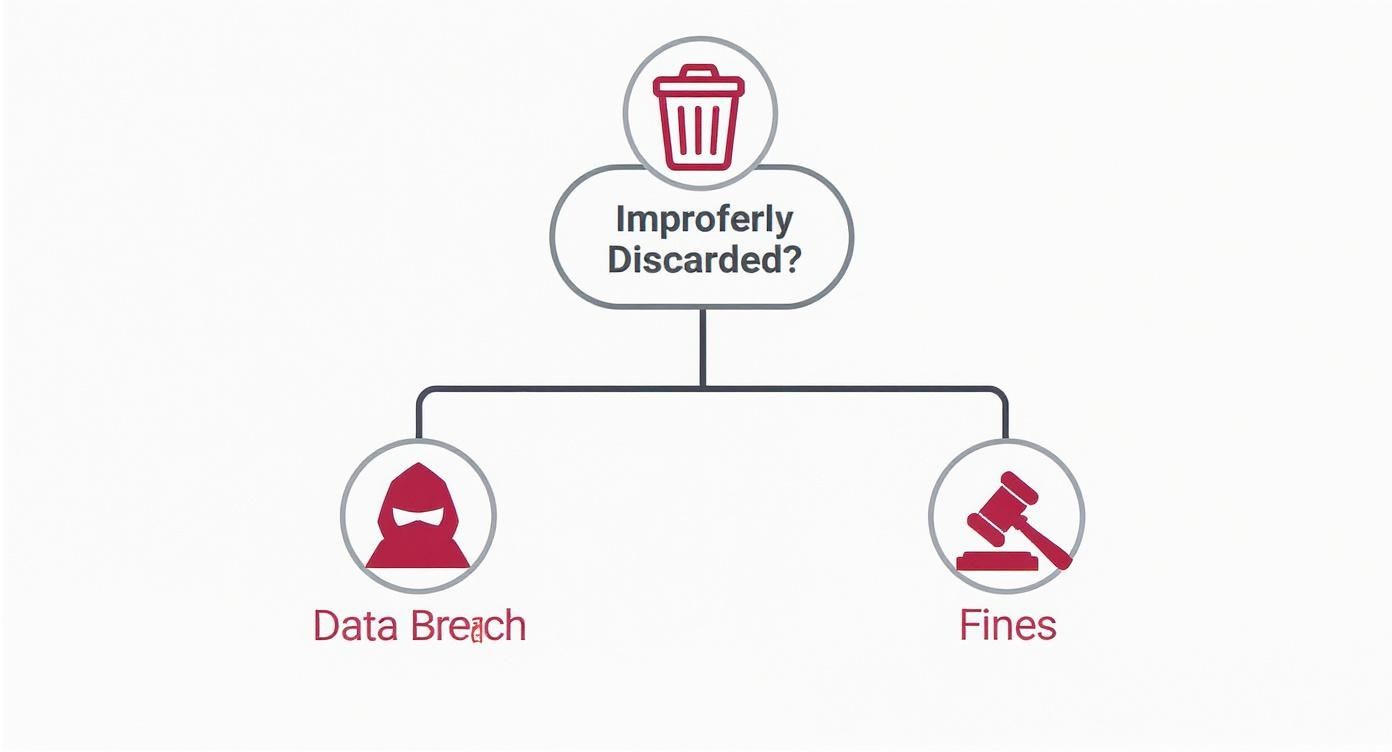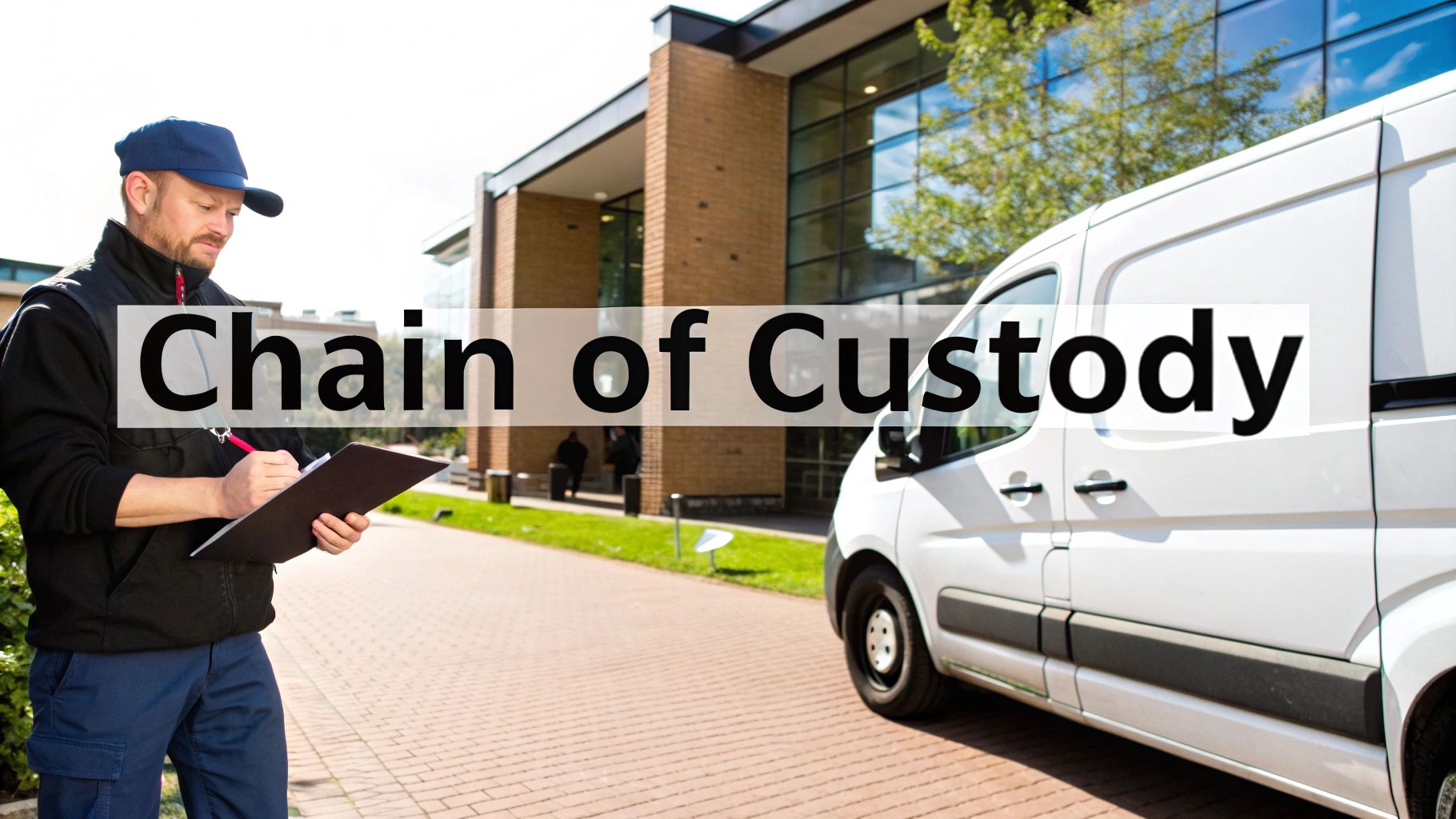Hard Drive Destruction Near Me: A Guide for Atlanta Businesses

When you punch "hard drive destruction near me" into a search bar, you're not just looking for a service. You're searching for peace of mind.
That single discarded hard drive sitting in a closet could be a goldmine for data thieves. A breach could mean costly regulatory fines, a PR nightmare, and permanent damage to the reputation you've worked so hard to build.
Why Your Business Needs a Local Data Destruction Partner
For any Atlanta business that handles sensitive information, securely disposing of outdated IT assets isn't just good housekeeping—it's a critical security function. Mishandle the process, and you open the door to everything from identity theft and corporate espionage to crippling non-compliance penalties.
Partnering with a local expert transforms this task from a logistical headache into a strategic advantage. It brings transparency, convenience, and a real chance to show your community what your brand stands for.
The need for professional data destruction has never been more pressing. Concerns over data security are fueling massive growth in the market. In 2024, it's a USD 1.65 billion industry, but it’s projected to explode to USD 5.05 billion by 2035. That's a compound annual growth rate of about 10.7%.
Beyond Convenience: The Strategic Value of a Local Partner
Working with a local Atlanta vendor gives you benefits that go far beyond a shorter drive time. It all comes down to accountability and trust.
A local provider means you can actually witness the destruction process firsthand, whether it's at your facility via mobile shredding or at their secure site. That direct oversight gives you irrefutable proof that your data is gone for good—something that’s invaluable when the auditors come knocking.
Even better, choosing the right partner can turn a routine operational cost into a powerful story for your brand. This is where a company’s mission really matters.
Choosing a partner that aligns with your values allows you to recycle with purpose. Instead of just destroying data, you can support meaningful causes, transforming e-waste into positive social and environmental impact.
Imagine your old technology helping to house a veteran or plant trees in a national forest. This approach instantly boosts your ESG (Environmental, Social, and Governance) profile by connecting a necessary security task to real, tangible community benefits.
When you partner with a mission-driven vendor, your business doesn’t just mitigate risk; it actively contributes to a better Atlanta. To get a clearer picture of what's at stake, check out our guide on why you should use a data destruction service. You're not just ticking a box—you're creating a compelling story for your stakeholders, showing a commitment that goes far beyond the bottom line.
Understanding Your Destruction and Compliance Needs
When you start searching for "hard drive destruction near me," it's easy to think all services are the same. They're not. The right method hinges entirely on how sensitive your data is and which specific compliance rules your Atlanta business has to follow. A healthcare clinic in Buckhead, for instance, has a completely different set of data protection responsibilities than a downtown law firm.
Picking the wrong method isn’t just a small mistake; it can spiral into serious legal and financial trouble. The whole point is to make your data 100% unrecoverable. Forever.
Matching Destruction Methods to Your Data Risk
When it comes to physically destroying a hard drive, you'll generally run into three main options: shredding, pulverization, and degaussing. Each one has its place, and knowing the difference is the first step to making a smart decision for your company.
Let's break down the common methods for destroying drives and what you need to know about each.
Comparing Data Destruction Methods
| Method | Process | Security Level | Best For | Compliance Alignment |
|---|---|---|---|---|
| Shredding | Industrial shredders cut drives into small, irregular pieces. Particle size is critical. | High | General business data, non-classified corporate information. | Meets most basic compliance needs like FACTA, but particle size must be small enough for NIST/HIPAA. |
| Pulverization | Drives are hammered and ground into tiny fragments resembling dust and sand. | Highest | Top-secret data, R&D, military-grade information, or any data requiring absolute certainty of destruction. | Exceeds all known compliance standards, including DoD, NIST, and HIPAA. |
| Degaussing | A powerful magnetic field erases all data from magnetic media like HDDs and tapes. | High (for data) | Organizations needing to sanitize magnetic media without physically destroying the drive itself. | Aligned with NIST 800-88 "Purge" standards. Often followed by physical destruction for full compliance. |
While shredding is extremely common, it can give a false sense of security. Modern hard drives pack a staggering amount of data into tiny spaces. Some standard shredding methods can leave 50-80% of the platter surfaces intact, meaning forensic tools could still potentially recover hundreds of gigabytes.
To make sure your destruction practices are up to snuff, it pays to get familiar with the various cyber security regulations and compliance frameworks.
This is why just tossing a drive in a shredder isn't always enough. One wrong move can lead straight to a data breach or a hefty fine.
As you can see, there are no good outcomes when hard drives are handled improperly—just different shades of risk.
Demystifying Compliance Standards
Compliance isn't just an IT buzzword; it's a set of legal rules dictating how you must protect data. For businesses here in Atlanta, a few key regulations pop up again and again. Your destruction vendor absolutely has to prove they can meet these standards.
The Certificate of Destruction you receive is more than a receipt—it's your legal proof of compliance. It must detail the what, when, where, and how of your data destruction to stand up in an audit.
Here are the heavy hitters you'll likely encounter:
- HIPAA (Health Insurance Portability and Accountability Act): This is non-negotiable for anyone handling Protected Health Information (PHI). HIPAA demands that PHI is rendered unreadable, indecipherable, and can't be reconstructed. Physical destruction is the gold standard here.
- NIST SP 800-88 (National Institute of Standards and Technology): Originally a guide for federal agencies, this has become the go-to standard for the private sector. It lays out precise procedures for clearing, purging, and destroying data on all kinds of media.
- FACTA (Fair and Accurate Credit Transactions Act): This rule forces businesses to destroy any consumer information that comes from credit reports to stop identity theft. It specifically requires that media be unreadable and impossible to piece back together.
Knowing the basics of these regulations helps you ask the right questions. Before you hire anyone, you need to understand the real difference between just wiping a drive and truly destroying it. Our guide explains what data sanitization truly means and which methods actually line up with standards like NIST 800-88. With that knowledge, you can confidently pick a partner who delivers the exact level of security and paperwork your business needs to stay safe and compliant.
How to Vet Local Atlanta Destruction Vendors
A quick search for "hard drive destruction near me" will flood you with options, but picking the right Atlanta vendor is about a whole lot more than just the price tag. The partner you choose is your last line of defense against a data breach, so this decision demands real scrutiny. It’s about making sure they have the right credentials, secure processes, and compliance protocols to protect your business.
When you're bringing on a data destruction partner, it pays to follow robust IT vendor management best practices. A solid vetting process is what protects your company's assets and reputation from day one.
The Non-Negotiables: Certifications and Security
Before you even get to a conversation about pricing, there are a few key credentials that any reputable vendor absolutely must have. These certifications aren't just fancy logos for their website; they're proof of rigorous, third-party audits that verify a company’s deep commitment to security and responsible recycling.
-
NAID AAA Certification: This is the undisputed gold standard for the data destruction industry. It ensures a vendor follows incredibly strict security protocols for everything from employee hiring and facility access to the destruction process itself. A NAID AAA certified vendor is also subject to surprise audits, which confirms they maintain these high standards year-round.
-
R2v3 or e-Stewards Certification: These certifications tackle the environmental side of disposal. They are your guarantee that after your hard drives are shredded, all that e-waste is recycled responsibly, ethically, and legally. This is what keeps toxic materials out of landfills and ensures your company meets its sustainability goals.
Without these certifications, you're taking a serious risk. An uncertified vendor simply may not have the secure chain of custody or the responsible downstream recycling processes needed to keep you compliant and protected.
Onsite vs. Offsite Destruction: Which is Right for You?
Another critical decision point is whether to have the destruction done right at your location (onsite) or at the vendor’s secure facility (offsite). Each has its own advantages, and the best choice really depends on your specific security needs and budget.
Onsite (Mobile) Destruction: A specialized shredding truck comes directly to your Atlanta office. You can physically watch your hard drives get destroyed, which offers the absolute highest level of security and peace of mind. For highly regulated industries like healthcare and finance, this is almost always the preferred method.
Offsite Destruction: The vendor transports your drives in a secure, locked vehicle to their facility for destruction. This option is typically more cost-effective. A trustworthy offsite vendor will provide a detailed chain-of-custody document, use GPS-tracked vehicles, and should always allow you to witness the destruction at their plant if you ask.
The most important question isn't just "Where does the destruction happen?" but "How do you prove it happened securely?" The vendor's ability to document every single step is what truly matters for your compliance records.
Beyond the Basics: Finding a Partner with Purpose
In today's market, the best partnerships go beyond a simple transaction. A vendor’s mission can—and should—align with your company’s values, turning a necessary operational task into a powerful ESG and CSR story.
When you're vetting Atlanta vendors, don't be afraid to ask about their social and environmental initiatives. Do they have a mission that resonates with your brand?
For instance, partnering with a vendor that supports local causes, like veteran aid or community reforestation, adds a meaningful layer to your e-waste program. Imagine turning your old tech into a tangible impact story with messaging like, “Your old tech can house a veteran and grow a forest.”
This approach transforms your hard drive destruction from a line-item expense into an authentic, purpose-driven initiative. You can use their impact reports—detailing trees planted or veterans supported—directly in your company's sustainability and community engagement reporting. When you're choosing between a few technically qualified electronic waste disposal companies, this kind of dual impact can be a powerful differentiator.
Your Vetting Checklist: Key Questions to Ask
Once you’ve shortlisted a few vendors, it’s time to dig into the details. Use these questions as a checklist to make sure you’re making a fully informed choice.
- Can I witness the destruction process? Whether it’s onsite or offsite, a transparent vendor will always accommodate this request without hesitation.
- What specific details are included in your Certificate of Destruction? To be truly audit-proof, it must list device serial numbers, date, location, method of destruction, and an authorized signature.
- What does your chain-of-custody process look like? Ask for specifics on their secure transport, locked containers, and employee background checks.
- How do you handle downstream recycling of the shredded materials? Confirm they partner with R2 or e-Stewards certified recyclers to ensure total environmental compliance.
- Do you offer any reporting on social or environmental impact? Ask if they provide data or documents, like Impact Certificates, that you can use for your own ESG and CSR reporting.
The Destruction Journey: From Your Office to Final Proof
So, you've done your homework and picked a certified Atlanta vendor. Great. Now comes the actual destruction day. Knowing what to expect here is key to making sure everything goes off without a hitch—smooth, secure, and with all the paperwork you need to prove it.
This isn't just about someone showing up to grab a box of old hard drives. It's a precise, managed process designed to give you complete peace of mind and an ironclad audit trail.
It all starts at your office. Before the truck even arrives, your team should pull together a simple inventory of the assets you're getting rid of. This is usually just a list of the serial numbers for each hard drive. It might seem tedious, but it’s a critical first step.
That inventory list becomes the backbone of the most important document in this initial phase: the chain-of-custody form. Think of this as the legal passport for your data. When the uniformed technicians get to your site, they'll check your inventory against the actual drives, lock them up in secure containers, and have you sign off. That signature officially transfers custody to them.
Secure Transport and Final Destruction
The moment those drives leave your building, they're under lock and key. Any reputable vendor will be using GPS-tracked vehicles and can show you an unbroken chain of custody right up until the drives hit the shredder—whether that's in a mobile truck at your curb or back at their secure facility. This isn't just for show; it's a fundamental part of compliance.
The machinery doing the work is serious business. The market for hard disk destruction equipment hit about USD 2.69 billion in 2024 and is expected to climb to USD 4.23 billion by 2032. Why? Because growing data privacy laws demand technology that can absolutely guarantee data is gone for good.
Whether you choose the convenience of onsite shredding or the scale of offsite destruction, the final act is the same: the complete physical obliteration of your drives. Every part of the process is built to make data recovery an impossibility.
The Proof Your Business Needs
Once the shredding is done, the journey wraps up with two vital documents. These aren't just receipts; they're your definitive proof of compliance and a powerful statement about your company's values.
-
Certificate of Destruction (CoD): This is your official, audit-proof record. It legally certifies that your hard drives were destroyed according to industry standards. A proper CoD will always include the date, the method used, a serialized list of the destroyed assets, and an authorized signature from the vendor. No exceptions.
-
Impact Certificate: This is something you'll only get from a mission-driven partner. It goes beyond just compliance and actually details the positive social and environmental good that came from your recycled e-waste.
An Impact Certificate turns a standard security task into a genuine ESG win. It gives you hard numbers—like how many trees were planted or veterans were supported with the value from your old tech—that you can plug directly into your annual CSR reports.
Imagine getting a report that says, “Your company’s recycled electronics helped plant 50 trees and supported 3 local veterans.” That’s a tangible story you can share with stakeholders, showing your commitment to the Atlanta community is real.
This two-part documentation gives you everything an auditor needs while also building your brand as a company that cares. To see exactly how we make this happen, you can learn more about our approach to secure hard drive shredding right here in Atlanta.
Turning E-Waste Disposal into an ESG Win
Let's be honest, searching for "hard drive destruction near me" usually feels like a chore. It's one of those necessary evils, a cost you have to eat to mitigate risk. But what if you could flip that script? What if that operational expense became a strategic advantage for your brand?
This is where secure data disposal gets interesting. It stops being just a security line item and transforms into a powerful tool for boosting your company's Environmental, Social, and Governance (ESG) profile.
Suddenly, the whole conversation shifts from cost to value. Your e-waste program can become a genuine pillar of your corporate social responsibility (CSR) efforts, creating real, measurable good right here in the Atlanta community.
Launching a "Recycle for a Cause" Campaign
One of the smartest ways to build brand value is through cause-based marketing. When you partner with a destruction vendor that has a dual mission—say, supporting both veteran aid and reforestation—you get to tell a much more compelling story.
Imagine a campaign with a simple, powerful message: “Your old tech can house a veteran and grow a forest.” That’s not just about recycling; it's about connecting with people on an emotional level. You’re showing how the simple act of decommissioning old equipment leads to tangible, positive outcomes.
To bring this to life, a mission-driven partner can provide live impact stats. Think of a real-time counter on their website or for your own CSR reports showing metrics like "1,245 veterans supported" and "3,700 trees planted." This kind of transparency isn't just talk; it's social proof that demonstrates a real commitment. Aligning these campaigns with key dates like Veterans Day or Earth Day can really amplify your message and drum up some positive local PR.
Forging Corporate ESG and CSR Partnerships
For corporate leaders, finding straightforward ways to hit ESG targets is a constant challenge. A purpose-driven electronics disposal program is an easy, authentic win. It’s a chance to take a standard operational process and infuse it with genuine social and environmental impact.
Think about organizing a corporate recycling drive. A vendor might offer free pickup for a certain volume of devices (like 50+ items) and, in return, provide your company with official documentation for your CSR records.
This isn't just a thank-you note. This documentation could include:
- Plant-A-Tree Certificates: Official verification of the number of trees planted in your company's name.
- Veteran Support Impact Reports: Detailed accounts showing how the value from your recycled assets directly contributed to veteran aid programs.
These documents are more than just feel-good materials; they are concrete data points for your annual sustainability reports. You can even earn a digital "Recycled with Purpose" badge to display on your website, signaling your commitment to responsible, impactful recycling.
By choosing the right partner, you're not just hiring a service. You're gaining an ally in your sustainability journey—one that provides the tools and stories you need to showcase your company's values in action.
Publishing case studies on platforms like LinkedIn can amplify this message even further, showing exactly how your company used its e-waste program to hit key sustainability benchmarks. This kind of thought leadership positions your brand as a forward-thinking, responsible leader in the Atlanta business community.
Engaging the Community and Building Credibility
The impact of your hard drive destruction program can extend far beyond your office walls. Partnering with a vendor that is deeply connected to the local community opens up doors for grassroots engagement and positive press.
Co-hosting recycling drives with local veteran shelters, VFW chapters, or environmental nonprofits is a powerful way to build a local presence. These events don't just collect more e-waste for a good cause; they generate goodwill and media attention. You could pitch stories to outlets like the Atlanta Journal-Constitution or local sustainability blogs about your company’s unique dual-impact model, resulting in valuable earned media.
Collaborations with schools, universities, and even city municipalities under a "Greener Atlanta" initiative can magnify your impact. When you select from the top electronic waste recycling companies, you're not just ensuring data security—you're investing in a partner who can help you build a legacy of positive change. By turning e-waste into hope, your business can prove that profit and purpose really do go hand in hand.
Your Top Questions About Hard Drive Destruction in Atlanta
Even after you've mapped out a plan, a few questions always pop up when you start searching for "hard drive destruction near me." We get it. Here are some straightforward answers to the questions we hear most often from businesses right here in Atlanta, designed to help you move forward with confidence.
How Much Does Hard Drive Destruction Cost in the Atlanta Area?
It really depends. The final price tag is shaped by a few key things: how many drives you have, the destruction method you choose, and whether the work happens at your place or theirs. Having a mobile shredding truck come to your office (onsite destruction) is the gold standard for convenience and security, but you can expect it to cost a bit more.
Most vendors in town will charge you either per drive or by the pound. Don't be afraid to ask about volume discounts if you have a large pile of media—most are happy to work with you. The most important thing is to get a detailed quote that breaks down every single fee, from transport and labor to the final paperwork. No one likes surprise charges.
Is Just Wiping a Hard Drive Good Enough?
Honestly, for anything truly sensitive, the answer is a firm no. Software wiping has its place for low-risk data, but it's far from foolproof. The process is surprisingly easy to mess up, and a determined person with the right forensic tools can often pull data fragments right off a "wiped" drive. It happens more than you'd think.
Physical destruction is the only way to be 100% certain your data is gone forever. There's a reason top-tier regulations like HIPAA and NIST 800-88 strongly push for physical destruction as the final step. It completely closes the loop and removes any lingering risk of a breach from that specific device.
What Should a Certificate of Destruction Actually Include?
Think of this document as your get-out-of-jail-free card during an audit. It’s your official, legal proof that you did everything by the book, and it's absolutely non-negotiable for compliance. A legitimate Certificate of Destruction is way more than a simple receipt.
A proper certificate creates an unbroken audit trail, proving you fulfilled your data protection obligations under stringent laws like HIPAA, GDPR, and FACTA.
Make sure yours includes these specific details, or it won't hold up:
- The exact date of destruction
- The method used (e.g., shredding to 15mm particles, pulverization)
- A serialized inventory of every single drive destroyed
- The location where the destruction took place
- An authorized signature from the vendor’s representative
Can We Host a Recycling Drive for Our Employees' Devices?
Absolutely! This is a fantastic idea and a great way to boost employee morale while hitting your company's ESG goals. When you partner with a certified vendor, you can easily set up a "Recycle for a Cause" event where team members can bring in their old personal electronics for secure, responsible disposal.
It’s a win-win. You help your team protect their own personal data, and you get to extend your corporate responsibility efforts right into the community. A mission-driven partner can even give you collective impact reports from the event, showing how many trees were planted or how much community support was generated. That makes for a powerful story to share.
Ready to turn your e-waste into a force for good? At Atlanta Green Recycling, we provide NAID AAA certified data destruction that not only protects your business but also supports veterans and reforestation efforts. We make compliance easy and impactful. Schedule your secure electronics pickup today.



